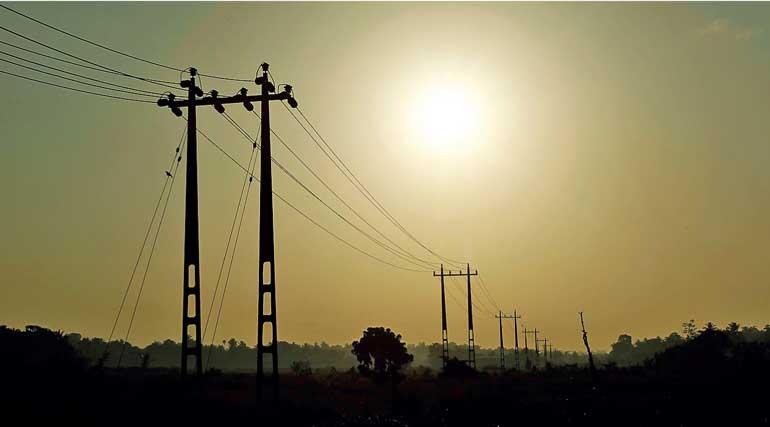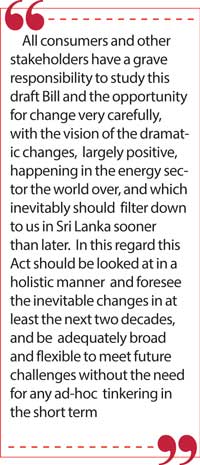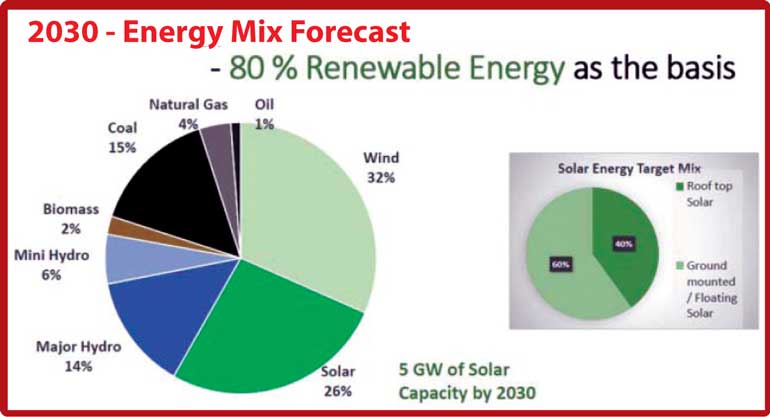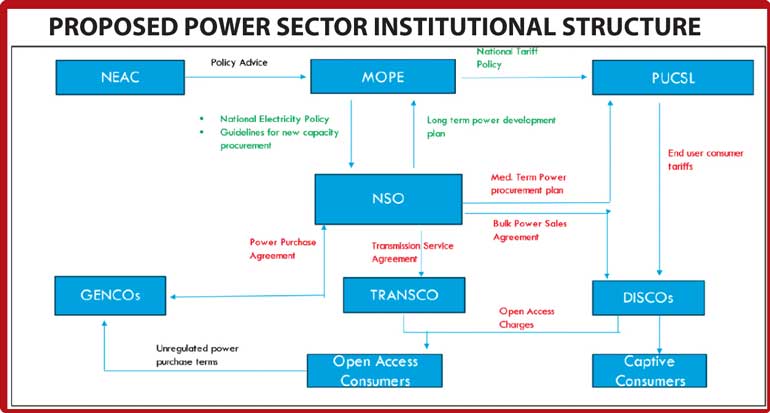Monday Feb 16, 2026
Monday Feb 16, 2026
Wednesday, 27 December 2023 00:30 - - {{hitsCtrl.values.hits}}

 A new draft for an Electricity Act has been approved by the Cabinet. The compulsion towards reform of the electricity sector has been driven by the dissatisfaction of all sectors of the current state of affairs. Since all prior attempts to reform and restructure the electricity sector to meet the aspirations of the main stakeholder, the consumer as well as to serve the country in the manner expected and remove these impediments, have failed, the need for a drastically different approach has to be expected as a reality. It is hoped the proposed new Act would fulfill this expectation. We have been given a valuable opportunity to review the proposed structure and provisions of the draft Act, now published in the Gazette, to examine the same and provide our inputs.
A new draft for an Electricity Act has been approved by the Cabinet. The compulsion towards reform of the electricity sector has been driven by the dissatisfaction of all sectors of the current state of affairs. Since all prior attempts to reform and restructure the electricity sector to meet the aspirations of the main stakeholder, the consumer as well as to serve the country in the manner expected and remove these impediments, have failed, the need for a drastically different approach has to be expected as a reality. It is hoped the proposed new Act would fulfill this expectation. We have been given a valuable opportunity to review the proposed structure and provisions of the draft Act, now published in the Gazette, to examine the same and provide our inputs.
The proposed draft Act that has incorporated the elements of the Expert Committee recommendations would therefore be acceptable and progressive, subject to the points raised. However, the absence of the National Electricity Policy and the National Tariff Policy referred throughout the document makes this like putting the cart before the horse, to push through a most important legislation which could have drastic implications, negative on the country for many decades. The belief that there is already a National Energy Policy is a myth considering that what was gazetted in August 2019 , was only an Electricity Policy, formulated by the Power and Energy Ministry and not supported by Parliamentary approval. Hence, the Power and Energy Ministry does not abide by its edicts.
Therefore, I emphasise that all consumers and other stakeholders have a grave responsibility to study this draft Bill and the opportunity for change very carefully, with the vision of the dramatic changes, largely positive, happening in the energy sector the world over, and which inevitably should filter down to us in Sri Lanka sooner than later. In this regard this Act should be looked at in a holistic manner and foresee the inevitable changes in at least the next two decades, and be adequately broad and flexible to meet future challenges without the need for any ad-hoc tinkering in the short term. Therefore, there are several national imperatives that must be recognised as essential to the provisions and the manner of application of the proposed Act. We must have the wisdom to rise above any prior perceptions and biases and accept the need to adopt and adapt to the drastic advances in technologies, and financial and commercial aspects of the energy sector in the best interest of Sri Lanka. Let us not get trapped into wasting much time on the short term issues such as how many times the tariff can be adjusted and such, on which time has been wasted already without discussing the basic issues that led to such knee jerk reactions, to tackle the day to day crisis situations.
It is my belief that we are in a fortunate position to convert the electricity sector (and later the energy sector ) in Sri Lanka from the current burden on the consumers and the economy to a highly profitable and vibrant economic activity , to boost our GDP, if we are clever enough to make this change with integrity and confidence using our own indigenous expertise and resources.
Sri Lanka has risen from a status of abject dependence on imported fossil fuels for its energy needs , particularly, for electricity generation, and to a slowly increasing and tantalising potential degree in transport energy to an undoubtedly resource rich nation.
Our natural resources of renewable energy, solar, wind, biomass and hydro are now unreservedly acknowledged as abundant many times more than our internal needs and definitely more economical and indigenous with no need for foreign expenditure for fuel inputs, and more economical than any form of imported fossil fuel based electricity generation.
According to a study by the Sustainable Energy Authority, “Sri Lanka has an onshore and offshore wind power potential of 102 GW, with 106 GW potential of solar power. To reach the renewable energy target we need only tap around 10 GW of solar and wind potential. Based on a very conservative projection of possibility of just 25% of this potential the possible export income is unbelievable as shown below. We expect these would be entirely for export being already self-sufficient for domestic use.”
A closer look at the 2030 target indicates the indigenous demand as:
Error! Filename not specified.
 Therefore, it is time for a completely new way of looking at energy in general and electricity in particular. It should no longer be considered as a mere support service for other sectors of the economy to grow, but a vibrant Sri Lankan industry with practically unlimited growth potential on its own, with the possibility to contribute significantly to the economic growth.
Therefore, it is time for a completely new way of looking at energy in general and electricity in particular. It should no longer be considered as a mere support service for other sectors of the economy to grow, but a vibrant Sri Lankan industry with practically unlimited growth potential on its own, with the possibility to contribute significantly to the economic growth.
Also, there are some national imperatives that must be held as non negotiable and inviolate and are of greatest national importance Viz:
Sustained national security cannot be assured without the security of supply of food and energy
) Such assurance of security in the long term can be guaranteed and sustained only by ensuring the energy sector is a Sri Lankan industry managed and controlled by Sri Lankans. Any foreign investments while welcome cannot violate this principle.
Does the new draft electricity Bill guarantee these national imperatives? It is hoped the Act has been drafted based on the findings of the Expert Committee appointed by the Minister. The committee made a presentation to some industry stakeholders prior to Cabinet approval of the draft Act. The structure proposed is given below.
Error! Filename not specified.
The full presentation by the committee is available on www.bioenergysrilanka.lk
To my understanding this structure is similar to what is being practised in Singapore and Australia, and by and large appears to meet the need of the day. It is, however, not clear to what extent the above committee participated in the drafting of the Act and if it has been designed to meet and facilitate the objectives of the sector as presented. Based on what has transpired there are grave doubts on this count and we have the responsibility to ensure that this requirement is met.
In addition, looking at the larger picture and the very likely future scenario emerging, a much broader and courageous outlook is required.
In the first instance, this Act must ensure the meeting of the following non negotiable and essential national imperatives that:
Energy resources are Sri Lanka’s own asset and belongs to the citizens
Ensuring future energy security essential for national security depends on the achievement of non dependence on imported fossil fuels and to be a Sri Lankan Industry controlled and governed by Sri Lanka
While any foreign investments are welcome and encouraged to make the transition smooth and on target, they must be compensated under the existing systems of BOI investments and there shall be no tariff paid in foreign exchange when the consumption is for local usage
Electricity industry should be viewed not merely as serving the energy needs of other sectors of the economy, but as a sector that can contribute heavily to the economy and GDP growth with employment generation, high level skills development and technical advancement.
The well recognised bounty of renewable energy many fold over the needs of the country should be developed as a means of earning foreign exchange, that is the best segment to invite foreigners to invest in this sector, who can be paid in foreign exchange while ensuring that the fair share of the benefits flow to the national economy as done by Middle Eastern countries with their oil reserves.
Now let us look at the particular clauses and provisions in the draft Act.
Throughout, the document refers to a National Electricity Policy and a National Tariff Policy. Both being nonexistent, raising the question, can an Act be passed, the operation of which would depend on the provisions of policies yet to be formulated?
A proper truly national energy policy (not limited to electricity) is a fundamental need to ensure the above. We are fortunate to be in a position to look forward to a not too distant future where all our energy needs without exception can be provided by electricity and in Sri Lanka, generated using indigenous renewable resources.
I therefore, propose that in the present instance a National Electricity Policy of which the National Tariff Policy is an integral part, should be developed before a new Electricity Act can be debated. The time required for this would be well spent to ensure a viable and robust Electricity Act and regulations that would stand the test of time.
Therefore, the development of this overarching policy as a national policy, mandatory to be observed by all quarters, must be done with the participation of relevant ministries, perhaps spearheaded by the Power and Energy Ministry, with a major role played by the Planning and Plan Implementation Ministry and the active participation and inputs of the Ministries of Environment, Transport, Industries, Agriculture and Lands, as a minimum.
The policy draft must be presented for public comments before adoption.
One would expect such an overarching policy to have a tenure of a minimum of five years without ad-hoc tinkering in the meantime, unless there is a compelling reason to do so. In such a situation too, it must go through the same rigorous evaluation and consultation. There can be no excuse for an urgency to rush through, that is an admission of lack of vision or appreciation of the rapid changes happening that must be foreseen with inevitable impact on Sri Lanka too.
Therefore, the provision in the draft Act for the National Electricity Policy to be drafted by the proposed National Electricity Advisory Committee (NEAC) appointed by the Minster himself is not acceptable.
The Act, expected to ensure compliance with the eventual national policy in all aspects, by regulations, guidelines and empowering the required institutions, to strategise and develop action plans must be careful to limit its scope to such responsibilities only.
The following points are made on perusal of the draft Bill and comparing the provisions made against the above national imperatives and desired national policies even while awaiting the implementation of a comprehensive national energy policy.
Specific comments on the draft Electricity Act
The committee appointed by the Minister to formulate the proposals for the restructuring, made a presentation on their proposals. These summarised in the chart shown above appear to be logical and visionary and in line with the practices adopted in other countries. Therefore, it is essential to verify that the proposed draft Act does indeed enable, and facilitate the implementation of the proposals made by the expert committee resulting in the expected positive outcomes.
The most significant feature of the committee proposal is to identify the appointment and roles of the two apex bodies, the National Energy Advisory Council and the Regulator. Both shall be completely independent and have complete freedom to ensure the provisions of the National Electricity Act (in the absence of the required overarching National Energy Policy) are complied with and the stated objectives of the Act achieved.
Therefore, it is essential that the NEAC is also formulated and appointed on the same lines as the PUCSL, the current regulator, if necessary, by another Act to ensure its independence. The present provisions in the draft Act for the NEAC to be appointed by the Minister defeats this purpose. On the same count it should not be in the Minister’s purview to remove any members of the NEAC as stated under section 8(b)
We must be honest enough to accept that the Power and Energy Minister, not referring to any particular individual, is not an expert in the electricity sector, either in technology or administration. It is foolhardy to expect so. Hence, the need for an NEAC comprising such experts who are able to understand not only the technologies, but other related aspects that have long term repercussions on the entire country. The Minister has the responsibility and wisdom to assess such advice in the crucible of common sense, to check compliance with national policies and most importantly in the best interests of the country, that is all that is expected of him and would thus be of best interests to the country.
Therefore, section 3 clause (11) is not acceptable as the Minster does not have the expertise to give directions on the National Electricity Policy to the NEAC as stated.
Furthermore, the repeated reference to a National Electricity Policy is meaningless as such policy does not exist and the formulation of the NEP is a mandate given to the NEAC, which itself is yet nonexistent, by section 4. This cannot be the purview of the NEAC as stated in Section 4.
It is acceptable for the Minister to provide policy guidelines in compliance with the provisions of an approved National Electricity Policy to the Regulator and the NEAC as per section 11.
National Tariff Policy
Similarly there are continued references to a National Tariff Policy that is yet to be formulated. Here too some transitional procedure is required.
National System Operator
The provision of the NSO is a progressive step and the responsibilities assigned to the NSO are acceptable. However, while not expected to be within the scope of the Act, there is lack of clarity on what basis the contenders to this post, expected to be 100% owned by the state, would be prequalified and the process of selection. This is an important position and such appointments should be made in a totally transparent manner with the qualifications and experience and competence of those vying for the selection listed clearly.
While the NSO does not have the same degree of independence as the Regulator and proposed by the NEAC, this is a most exacting and important position calling for a high degree of competence and experience to perform the function assigned. As such the NSO must enjoy the fullest independence to operate only limited by the provisions of the National Electricity Policy and the National Tariff Policy, once in place. There cannot be any room for intervention by the Minister as stated in Part IV clause No (10) 3 to give directions to the NSO. The NSO selected by proper process should have the competence to perform its duties and responsibilities without the directions of the Minister except on matters concerning compliance with the approved National Electricity Policy.
The provision for the NSO to be developing the Long Term Electricity Generation Plan (LTEGP) for the time horizon of only five years is a welcome provision considering the rapid changes in the sector.
However, the provision for the Minister to offer amendments to the same is not tenable, unless it is spelt out under what circumstances and date the Minister may offer such amendments. This is a case of interfering with the scope and responsibilities assigned to the NSO, which shall be under the provisions of the National Electricity Act.
Transmission Network Service Provider
The above points apply to this appointment as well. Is this the position listed as “TRANSCO” in the expert committee recommendation”? Some clarity is required, as there is ambiguity regarding this.
Generation licence
The clause below under Part VII – Licensing
“19 (1) Any person shall be eligible to apply for the issue of a generation licence” is totally unacceptable. It has been stated earlier that to ensure national energy security the electricity industry must be under Sri Lankan control and monitoring. This permission for anyone to apply for a generation licence would open the doors to foreign entities to dominate the industry facilitated by incentives of their Governments and lower cost of funds, etc. which are not available for Sri Lankan investors. This is a dangerous opening that must be corrected by requiring at least 25% local participation for any generation licensee , holding majority shares by non nationals. Any excuse such as possibility of lower consumer tariff etc. cannot override the issue of national security and the larger benefits accruing to Sri Lanka by the development of local entrepreneurs. It is already proven that such open door policy in case of the Petroleum sector has not generated expected competition and consumer benefits.
It is to be noted that the safeguard provided under the Electricity Act No 20 of 2009 in this regard was removed in the amendment in2023 and in view of current ground realities, it must be re-introduced in a pragmatic manner. This unwise vacuum created could lead to the grave risk of losing control of our energy sector to foreign entities. Refer the article https://www.dailymirror.lk/opinion/Indo-Sri-Lanka-Grid-Connectivity-Its-Pros-and-Cons/172-273389 by Attorney at Law Canishka G Witharana .
A provision closely associated with this issue is the need to ensure transparency and competitiveness of the generation options selected to ensure the principle of achieving least economic cost of generation. The best means of achieving this double objective was enshrined in all past and the current Act, is the requirement for an open tender procedure for all generation project of capacity greater than 25 MW. For some strange reason this provision appears to have been omitted or not given any emphasis in the draft Act.
Ensuring Sri Lankan control of the sector and harnessing future economic benefits
There is no provision in the Act to address the above essential need nor to protect and enhance the Sri Lankan electricity industry that is a sine qua non for the above. Perhaps, this arises from the fact that the Act is drafted in the absence of a suitable National Electricity Policy in which the above should be distinctly enshrined.
Transfer of current duties and responsibilities of CEB
It is noted that the present responsibilities and duties of the CEB will be transferred to a number of Companies, some remaining as 100% State owned. However, there is no indication to clarify under which company the current IPPs and the RE Developers with SPPAs would be governed. Who will be responsible for payment for the energy generated? It is also disturbing to read that the present SPPAs will be terminated in nine months and would have to be re negotiated. While a more bankable SPPA would be welcome, this provision brings in a sense of uncertainty to the present developers who have signed contracts with a life of 20 years.
Concluding remarks
There appears to be an attempt to vest undue powers on the Minster who does not have the necessary expertise or background to take up such responsibilities. He has the services of the NEAC and the Regulator both of who shall be totally independent, only governed by the National Electricity Policy and the National Tariff Policy (both yet to be formulated) to resolve any issues of concern .
The question arises as to the validity of this Act based on the stipulations of a Policy that is nonexistent. Therefore, rather than rushing in to a new Act, it is better to formulate at least the National Electricity Policy with proper consultation and stakeholder comments including the National Tariff Policy. The preferred way forward is to develop a National Energy Policy of which the National Electricity Policy should be an integral and important subset. However, in the interests of time and the need for early restructuring of the electricity sector, that is much easier, a visionary National Electricity Policy formulated as described above is acceptable.
While it is necessary to have an overarching National Energy Policy, the proposed National Electricity Policy developed with an eye on the broader objectives of a National Energy Policy may be used in the interim.
Urgent action is needed as there may be attempts to rush through this Act to promote hidden agendas.


(The writer could be reached at E Mail [email protected])